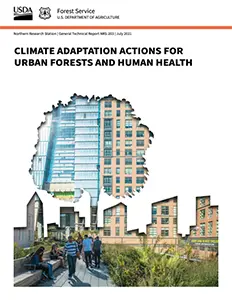 This report from the U.S. Department of Agriculture, Forest Service, Northern Research Station synthesizes adaptation actions to address climate change in urban forest management and promote human health and well-being through nature-based solutions. It compiles and organizes information from a wide range of peer-reviewed research and evidence-based reports on climate change adaptation, urban forest management, carbon sequestration and storage, and human health response to urban nature.
This report from the U.S. Department of Agriculture, Forest Service, Northern Research Station synthesizes adaptation actions to address climate change in urban forest management and promote human health and well-being through nature-based solutions. It compiles and organizes information from a wide range of peer-reviewed research and evidence-based reports on climate change adaptation, urban forest management, carbon sequestration and storage, and human health response to urban nature.
Urban areas can be particularly vulnerable to climate change due to extensive impervious cover, increased pollution, greater human population densities, and a concentration of built structures that intensify impacts from urban heat, drought, and extreme weather. Urban residents are at risk from a variety of climate stressors, which can cause both physical and mental harm. Urban forests and tree cover provide a critical role in helping cities address climate change by supporting greenhouse gas mitigation, reducing the impacts of extreme heat and altered climate that impair human health, and helping communities to adaptively respond through engagement with nature. At the same time, urban forests are vulnerable to changes in climate and in need of robust strategies to adapt to those changes.
As climate change impacts increase, efforts to “green” cities and adapt urban forests to changing conditions take on greater importance to support human health and well-being. Urban forest managers and allied professionals are looking for information to reduce climate risks to urban forests and secure their benefits for people and ecosystems. This report, Climate Adaptation Actions for Urban Forests and Human Health, synthesizes adaptation actions to address climate change in urban forest management and promote human health and well-being through nature-based solutions. It compiles and organizes information from a wide range of peer-reviewed research and evidence-based reports on climate change adaptation, urban forest management, carbon sequestration and storage, and human health response to urban nature.
This report includes the Urban Forest Climate and Health Adaptation Menu, which presents information and ideas for optimizing the climate and human health outcomes of urban forestry projects and provides professionals who are working at the intersection of climate, public health, and urban forestry with resources to support climate adaptation planning and activities. Notably, it does not provide specific recommendations or guidance for any particular place; rather, it offers a range of action opportunities at different scales that can be incorporated into either comprehensive or specific climate adaptation initiatives. The Menu can be used with an existing, tested adaptation process to help managers consider climate risks and explore the benefits and drawbacks of potential adaptation actions within the context of a particular situation or project. It also can be useful for generating productive discussions about community needs and values to guide planning, education and outreach, research, or changes in policy or infrastructure within communities.
Click here to view the report.




